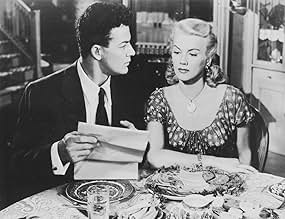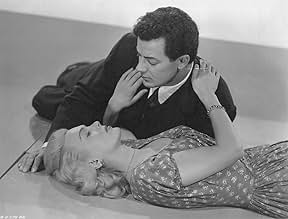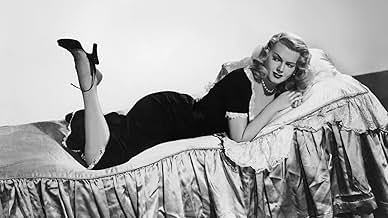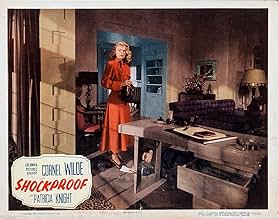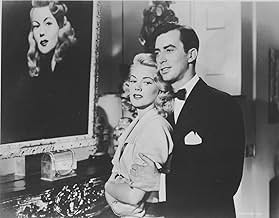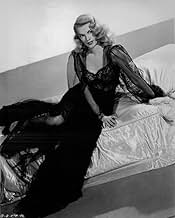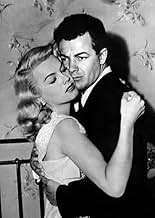IMDb-BEWERTUNG
6,5/10
2431
IHRE BEWERTUNG
Füge eine Handlung in deiner Sprache hinzuA parole officer falls in love with his client, a ravishing blonde who served time for murder, and he's determined to help her go straight despite her interfering criminal boyfriend.A parole officer falls in love with his client, a ravishing blonde who served time for murder, and he's determined to help her go straight despite her interfering criminal boyfriend.A parole officer falls in love with his client, a ravishing blonde who served time for murder, and he's determined to help her go straight despite her interfering criminal boyfriend.
Shirley Adams
- Emmy
- (Nicht genannt)
Gilbert Barnett
- Barry
- (Nicht genannt)
Richard Benedict
- 'Kid' - Knife Wielder
- (Nicht genannt)
Paul Bradley
- Airline Clerk
- (Nicht genannt)
Argentina Brunetti
- Stella
- (Nicht genannt)
Paul Bryar
- Man in Car
- (Nicht genannt)
John Butler
- Sam Green, Pawnbroker
- (Nicht genannt)
Claire Carleton
- Florrie Kobiski
- (Nicht genannt)
Cliff Clark
- Mac - Police Lieutenant
- (Nicht genannt)
King Donovan
- Joe Wilson
- (Nicht genannt)
Al Eben
- Joe Kobiski
- (Nicht genannt)
Handlung
WUSSTEST DU SCHON:
- WissenswertesThis film features the iconic Bradbury Building at 304 S. Broadway as the location of Griff Marat's office. Out of his office window can be seen the old Hall of Records Building at 220 N. Broadway (demolished 1973), which is about 0.4 miles away.
- PatzerAs Griff is taking Jenny to the "restaurant" the same traffic scene of passing cars repeats in the car's rear window.
- Zitate
Jenny Marsh: I'm no longer asking you to say goodbye. I'm just saying it!
- Crazy CreditsFollowing the opening credits the camera pans onto the curb edge of the road which reads HOLLYWOOD BLVD.
- VerbindungenFeatured in Behind the Mirror: A Profile of Douglas Sirk (1979)
Ausgewählte Rezension
Shockproof (1949)
Sam Fuller, the writer of this film, is admired for breaking rules and being a little bit edgy. Douglas Sirk, the director, is known for sumptuous, no compromise melodramas with gorgeous dreamy sets and an arch and affecting artificiality. They make an odd mix, and something doesn't quite click here.
The plot is standard fare but good--a parole officer falls for a reluctant parole, who still has a thing for a thug up to no good. The officer is terrific, Cornell Wilde at his regular guy best, a kind of echo of Dana Andrews with a little more warmth. But the main woman, Patricia Wright, is a bit wooden. You can feel her trying too hard too often, and it's just one of those things that cuts the rest of the effort down to size. Not surprisingly, she was only in five feature films, and was the lead in only one other.
But setting aside her presence and its deadening effect, there are some things to really enjoy here. You might find the movie ordinary for awhile, with some nice clichés and a steady development. But then, halfway, there's a huge and really sudden twist. And a believable one, a great scene. Suddenly there is a whole new plot. We aren't quite involved enough with the two leads to get swept away in their love affair (as we certainly do in "Gun Crazy" two years later, or in "They Live by Night" the same year), but it's exciting anyway. There are some scenes at an oil rig and the worker's cabins (I assume it's a set) that are gorgeous.
And then there's a sixty second surprise ending that doesn't do the movie justice and is very unlike Fuller. It's almost like someone took the script from Fuller and said, no Sam, that won't do. And rewrote it. And in fact that's what happened. One of the Columbia producers, Helen Deutsch, stepped in to remove Fuller's violent first intention. In fact, that final scene wasn't even directed by Sirk, who quit Columbia and left the country in anger (only to return and start a string of his famous 1950s masterpieces). A detailed account of all this is at www.tcm.com/this-month/article/208688%7C0/Shockproof.html.
What else? The photography by Charles Lawton Jr. is great (he had just done Welles's vigorous "Lady from Shanghai"), and a lot of the side actors are really good, especially the gambler boyfriend played by John Baragrey. This is one of those films to enjoy in pieces, or to enjoy for how it fits into the chronologies of some of the people who made it. Wilde and Knight, by the way, were still married during the filming (Wilde insisted Knight get the part) but they split up in 1951.
Sam Fuller, the writer of this film, is admired for breaking rules and being a little bit edgy. Douglas Sirk, the director, is known for sumptuous, no compromise melodramas with gorgeous dreamy sets and an arch and affecting artificiality. They make an odd mix, and something doesn't quite click here.
The plot is standard fare but good--a parole officer falls for a reluctant parole, who still has a thing for a thug up to no good. The officer is terrific, Cornell Wilde at his regular guy best, a kind of echo of Dana Andrews with a little more warmth. But the main woman, Patricia Wright, is a bit wooden. You can feel her trying too hard too often, and it's just one of those things that cuts the rest of the effort down to size. Not surprisingly, she was only in five feature films, and was the lead in only one other.
But setting aside her presence and its deadening effect, there are some things to really enjoy here. You might find the movie ordinary for awhile, with some nice clichés and a steady development. But then, halfway, there's a huge and really sudden twist. And a believable one, a great scene. Suddenly there is a whole new plot. We aren't quite involved enough with the two leads to get swept away in their love affair (as we certainly do in "Gun Crazy" two years later, or in "They Live by Night" the same year), but it's exciting anyway. There are some scenes at an oil rig and the worker's cabins (I assume it's a set) that are gorgeous.
And then there's a sixty second surprise ending that doesn't do the movie justice and is very unlike Fuller. It's almost like someone took the script from Fuller and said, no Sam, that won't do. And rewrote it. And in fact that's what happened. One of the Columbia producers, Helen Deutsch, stepped in to remove Fuller's violent first intention. In fact, that final scene wasn't even directed by Sirk, who quit Columbia and left the country in anger (only to return and start a string of his famous 1950s masterpieces). A detailed account of all this is at www.tcm.com/this-month/article/208688%7C0/Shockproof.html.
What else? The photography by Charles Lawton Jr. is great (he had just done Welles's vigorous "Lady from Shanghai"), and a lot of the side actors are really good, especially the gambler boyfriend played by John Baragrey. This is one of those films to enjoy in pieces, or to enjoy for how it fits into the chronologies of some of the people who made it. Wilde and Knight, by the way, were still married during the filming (Wilde insisted Knight get the part) but they split up in 1951.
- secondtake
- 23. Aug. 2011
- Permalink
Top-Auswahl
Melde dich zum Bewerten an und greife auf die Watchlist für personalisierte Empfehlungen zu.
- How long is Shockproof?Powered by Alexa
Details
- Erscheinungsdatum
- Herkunftsland
- Sprachen
- Auch bekannt als
- Shockproof
- Drehorte
- Produktionsfirma
- Weitere beteiligte Unternehmen bei IMDbPro anzeigen
- Laufzeit1 Stunde 20 Minuten
- Farbe
- Seitenverhältnis
- 1.37 : 1
Zu dieser Seite beitragen
Bearbeitung vorschlagen oder fehlenden Inhalt hinzufügen

Oberste Lücke
By what name was Unerschütterliche Liebe (1949) officially released in India in English?
Antwort
